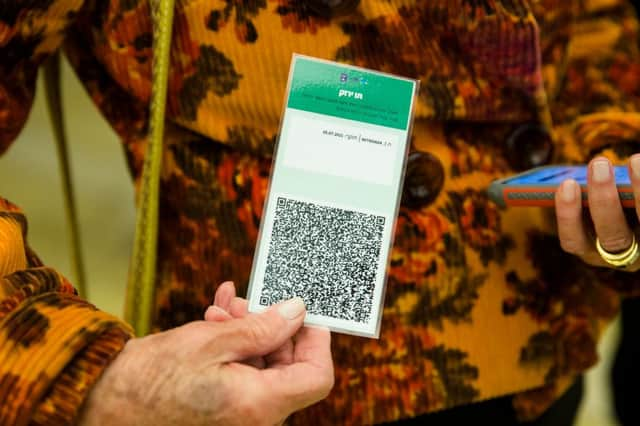Vaccine passports are the latest show of government contempt for young people's lives
This article contains affiliate links. We may earn a small commission on items purchased through this article, but that does not affect our editorial judgement.


While I’m not a conspiracy theorist by nature, I have pondered the existence of a middle-aged keyboard warrior network who are simultaneously pinged a notification each time someone under the age of 35 complains about something online.
Whether a grievance over insecure work, the lack of affordable housing or the current lockdown, no Tweet or post must be left unremarked on by a member of the network, whose solemn duty it is to remind the ungrateful brats that their problems are nothing compared to the horrors of wartime Britain: an era hardly anyone posting on Twitter actually lived through themselves.
Advertisement
Hide AdAdvertisement
Hide AdBaby boomers chiding young people for their perceived privilege is nothing new, of course, but the pandemic has turned comparisons of who-has-it-worse into a competitive sport. Everywhere you look online are one-uppers seeking to remind anyone daring to feel miserable during a global crisis that their complaints are trivial at best, frivolous at worst.
Young people have become particularly popular targets for this type of ire and mockery throughout the past year. Regularly, we’re reminded that spending the best part of a year trapped indoors and foregoing most of what made our lives fulfilling shouldn’t be difficult, let alone constitute sacrifice on our part.
It’s a perception not only upheld by older generations but enshrined in government policy, which has consistently ignored the concerns, experiences and realities of young people’s lives. The latest plans on vaccine passports, which would disproportionately affect the young, come as little surprise.
For over a year now, young people have, quite rightly, given up their normal lives to shield the elderly and vulnerable from coronavirus.
Advertisement
Hide AdAdvertisement
Hide AdYet in return, they’ve been left the hardest-hit by the crisis in financial terms. Compared to over-40s, young people are more likely to have lost work and income, gone into debt, withdrawn pension contributions and drawn on their savings than their older counterparts.
According to the Financial Conduct Authority, those aged 18-34 and the self-employed saw their financial vulnerability rise by more than 40 per cent, while under-35s accounted for almost 90 per cent of job losses in the past year.
If this weren’t bad enough, government coronavirus policies have been put in place for the most part as if young people didn’t exist. When a mortgage holiday was introduced in early 2020, renters - a group dominated by young people - received no such financial aid.
More likely than their older counterparts to live in overcrowded house shares, many young people have been forced to work from home in cramped, miserable conditions for the past year while work-from-home policies have been cheerfully discussed as a fun perk of the pandemic.
Advertisement
Hide AdAdvertisement
Hide AdPolicies on socialising, meanwhile, have worked on the assumption that everyone lives with a partner or spouse, dismissing the needs of young single people and those who do not cohabit with a partner. At the time of writing, non-cohabiting couples in England have been banned from staying with each other since January 4.
In this context, it’s not difficult to understand why introducing vaccine certification before healthy young people have been offered the jab feels like an extra kick in the teeth. Even with negative tests as an alternative, questions still remain around how readily available and expensive this testing may be for the unvaccinated.
While the need for checks and balances to keep coronavirus under control are understandable, the flippancy with which the government is proposing the passport policy for events is infuriating.
The image, in fact, of young people being forced to staff events that they themselves would have difficulty attending couldn’t be a better metaphor for the way under-35s have been treated by the government even before the pandemic began.
Advertisement
Hide AdAdvertisement
Hide AdStuck in insecure, low-paid work, young people have spent years paying extortionate rents which leave us unable to save money to buy homes. Degrees, now mandatory for many jobs, have saddled us with thousands of pounds worth of debt while prices rise, wages stagnate, and older generations constantly remind us what privileged snowflakes we are.
A vaccine passport which precludes the young from returning to nightclubs and large events after a year stuck inside is yet another show of contempt by a government who have long lacked the political will to improve the lives of young people - a group who do not form the main bloc of their voters.
If carried through without further thought on the impact for the under-35s, the results won’t just be disparate anger and frustration, but disaffected youth, intergenerational strife and a young population distrustful of the institutions they’re governed by.
With young people more willing than ever to take to the streets in protest, it’s a risk the government would be foolish to ignore.
Do you agree? Have your say on our Facebook page